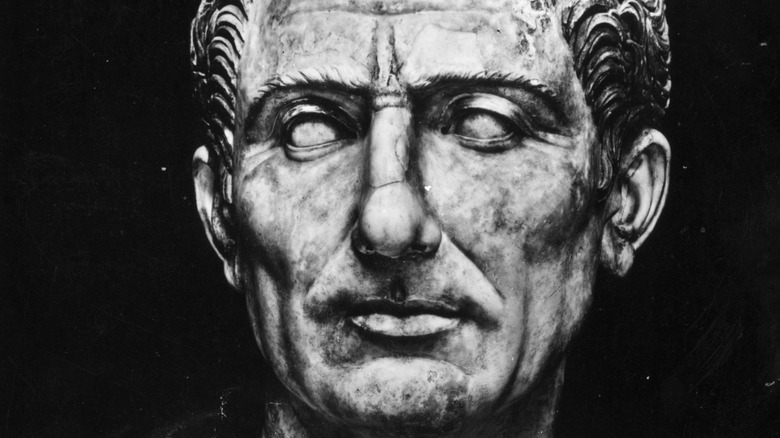Was Julius Caesar Really Born By Cesarean Section?
Among the most notable generals and leaders of ancient Rome was one Julius Caesar, who is remembered both for his triumphant campaigns against the Gauls and his sudden, bloody death at the hands of a group of assassins on the Ides of March, 44 B.C. (per Britannica). Tales continue to be told of him centuries after his death, and it's widely believed that he was born by cesarean section — and even that the procedure's name is derived from Caesar's.
The people of the ancient world, it seems, did have knowledge of such a procedure. According to the U.S. National Library of Medicine, the ancient Chinese and Egyptians were just two of many cultures who produced descriptions and images of the surgical birth, though it would have borne little resemblance to the procedure as it's performed today.
The Romans of Caesar's time lived under a very specific law that would have rendered his birth by cesarean very unlikely.
Cesareans in Caesar's time
Death during childbirth was a tragically common occurrence in the ancient world. As Donald Todman writes in "Childbirth in ancient Rome: From traditional folklore to obstetrics," "traditional Roman medicine centered on folklore and religious practices, but with the development of Hippocratic medicine came significant advances in the care of women during pregnancy and confinement."
The U.S. National Library of Medicine goes on to explain that the Romans, who could rarely resist a spot of conquering, needed a way to keep their birth rates up and their populations high. And thus, the law during Ceasar's reign stated that parents who sadly died in childbirth — or whose death was imminent — would have to be cut open in an attempt to save the baby's life. This practice, it seems, may have given the procedure its name: "Caesones" was the term used to refer to a baby born in this way, while "caedare" means the act of cutting.
In short, Caesar's mother would apparently have died in childbirth for her son to have been born by cesarean.
Pliny the Elder's confusing words start the legend
Julius Caesar's mother, Aurelia Cotta, certainly didn't die giving birth to him, as ThoughtCo states. She raised her son, ensuring that he got the finest education from the respected scholar Marcus Antonius Gnipho along the way. She died years later, at home in Rome, while Caesar was away waging war. As such, it's highly unlikely that Caesar was born by cesarean section. By the standards of the time, the brutal procedure would almost certainly have resulted in the laboring parent's death, if not that of the child too, as Tales of Times Forgotten adds.
The suggestion that cesarean got its name from Ceasar may be traced back to the words of Pliny the Elder, who wrote in his "Natural History" (per the Loeb Classical Library's H. Rackham, via Tales of Times Forgotten): "It is a better omen when the mother dies in giving birth to the child; instances are the birth of the elder Scipio Africanus and the first of the Caesars, who got that name from the surgical operation performed on his mother."
The identity of the "first of the Caesars" is open to interpretation, as is the ultimate origin of the term cesarean section itself. It appears certain, though, that Julius Caesar was not born this way.


